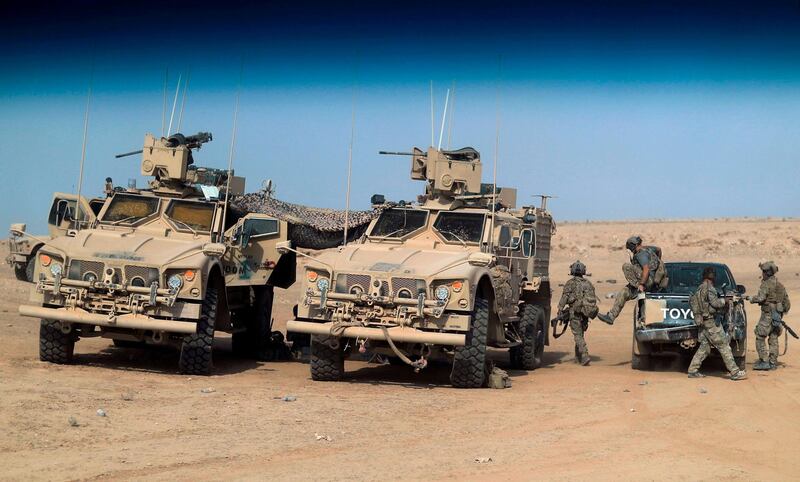The fate of hundreds of foreign ISIS fighters and their families held by Kurdish forces in northern Syria is becoming a sticking point as the United States prepares to withdraw its troops from the country.
Some 2,000 American troops have been helping the Kurdish-led Syrian Democratic Forces (SDF) fight ISIS since 2015. But after President Donald Trump announced an imminent US withdrawal last month, SDF officials reportedly considered releasing its ISIS foreign prisoners, which they say are not their responsibility.
On Tuesday, a senior US official said making a plan to keep these prisoners in custody was a top priority as the US government prepared to drawdown its forces. Releasing the fighters would be "unacceptable" as they could rejoin ISIS in Syria or elsewhere, the official told the Associated Press on condition of anonymity.
The SDF have continued taking ISIS prisoners as it targets the last pocket of ISIS control in the Euphrates River valley. On Sunday, it announced capturing five foreign citizens reportedly from the US, Pakistan and Ireland on Sunday. One man, Zaid Abed Al Hamid, was identified as a US citizen of Trinidadian origin, while another, Warren Christopher Clark, was said to be a teacher from Texas. Only four other American ISIS members are known to have been captured alive in Iraq and Syria.
Citizens of 44 countries are held by the SDF in about seven makeshift prisons in northeast Syria. They could include up to 1,100 ISIS fighters, recent reports suggest. Among them are British citizens Alexanda Kotey and El Shafee ElSheikh, who are believed to be two of the four notorious “Beatles” responsible for executing western journalists and aid workers. But the SDF also holds about 2,000 relatives of ISIS members in three guarded camps, including about 1000 children.
So far though, most governments have been reluctant to repatriate their citizens. Part of the hesitance stems from the difficulty of prosecuting ISIS members in western courts. A lack of admissible evidence makes it difficult to prove crimes that took place in an overseas war zone. If not imprisoned, governments fear that returning radicalised citizens may spread extremism or carry out terrorist attacks at home.
In October, the Guardian reported that only around 60 foreign prisoners held by the SDF had been repatriated, to countries including Sudan, Russia, Indonesia, the US, Kazakhstan and Iraq. The same month, France announced plans to repatriate 150 children, but not their mothers. That transfer is yet to take place.
__________
Read More:
Trump says Syria policy unchanged even as troop withdrawal extended
UK has 'no plans' to resume diplomatic relations with Syria
US seeking to ensure 'Turks don't slaughter the Kurds' in Syria
__________
After Mr Trump's surprise withdrawal announcement last month, the head of the Syrian Observatory on Human Rights reported that the SDF was considering releasing its prisoners. A spokesman for the SDF denied that there had been discussions over releasing prisoners, but a western coalition official told the New York Times that the discussions took place.
Foreign countries have “a moral and legal responsibility” to take back their citizens, the head of foreign relations for the Kurdish administration in northeast Syria says. “That is why we are calling on the international community to fulfill this duty,” Abdulkarim Omar said in October. “Every country should put their own citizens on trial.”
Our region is unstable, any chaos may enable IS fighters to flee, Some of those fighters are dangerous and may pose serious threats on Europe and the international community.
— Dr Abdulkarim Omar (@abdulkarimomar1) October 6, 2018
His administration had neither the resources nor the ability to prosecute ISIS members, he said.
The US withdrawal raises the prospect that Nato ally Turkey could attack Kurdish forces in Syria, which Ankara considers an extension of the outlawed Turkish Kurdistan Workers’ Party (PKK). In which case, SDF officials say they would be unable to hold ISIS prisoners after a US withdrawal.
The US is now reportedly considering sending some of the most dangerous prisoners to Guantanamo Bay prison as enemy combattants, for fear that released ISIS members could make their way beyond Syria’s borders. As Mr Omar wrote in October: “Some of those fighters are dangerous and may pose serious threats on Europe and the international community.”





